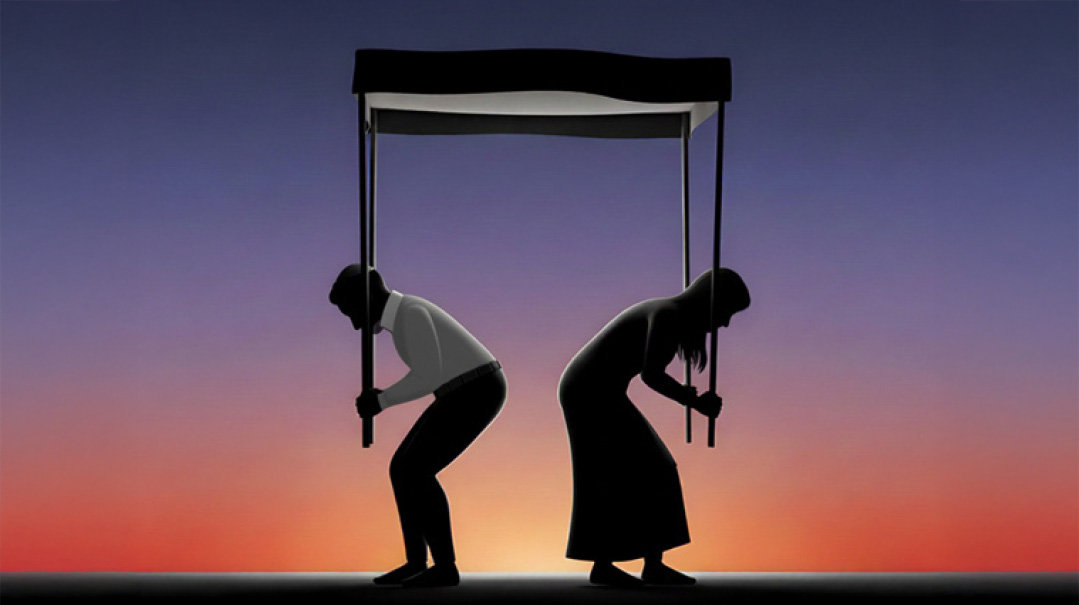When Tragedy Strikes


Five weeks ago, we published a conversation with the Ginzburgs, a Beitar couple who lost two children during a horrific flash fire. The feature spoke of their faith, the sparks of Hashgachah they found in the tragedy, and their heartfelt request to all of Klal Yisrael.
Shortly afterward, we received a letter from a disappointed reader.
I was appalled at the insensitivity shown to the Ginzburg family in their painful mourning. Asking such point-blank questions about an avel’s levels of faith or how they took the tragedy is almost cruel…. I do not know if there is ever a proper time to pose these questions to a person who has suffered such painful loss, but definitely not during their shivah!
While at times there is much inspiration to gain from the stalwart faith of those who have been through tragedy, it is not our place to prod and pester just to extract some hisorerus. This is true for friends and relatives that have come for the sole purpose of comforting the mourners, and all the more so for a publication that is just trying to get the best quotes for their feature stories. A magazine, and its writers, must be more careful. Don’t use, or abuse, people’s pain just to get a good article.
A.N.
I wasn’t surprised to receive the letter, and I probably could have written portions of it myself. We often grapple with precisely this question.
In this case, though, I knew the backstory — and it changed my perspective.
When the story broke, Eliezer Shulman — a veteran Hebrew-speaking editor and writer who volunteers as a Hatzolah and Zaka member — offered to interview the Ginzburg family about their loss. The gut reaction among many of the native Americans on staff was “no way, that would be so insensitive.”
Eliezer Shulman promised not to write anything “yellow” or sensationalist, and to respect whatever boundaries the couple would set. He would visit them, and if they wished to talk, he’d write a piece. If not, not.
That evening he visited the shivah home and Rabbi Ginzburg shared his amazing words of emunah. The next morning, he received a phone call from Mrs. Ginzburg. She apologized that she hadn’t paid much attention to him the night before and told him she wanted to speak to him, and through him, to Mishpacha’s readership, because she had a message and request to share with the frum world. We ended up adding at least two more pages to the piece on a closing day, because of her moving outpouring of faith, and because she so wanted to get out her message.
That’s not the end of the story. Rabbi Ginzburg was featured on the cover of the Hebrew-language magazine (with his agreement, of course). After reading it and hearing other readers’ reactions, he called Eliezer Shulman to thank him for the beautiful piece and the respectful way it was done.
Thinking about the disparity between the reader’s perception and the family’s gratitude, I realized that there’s a cultural element at play. Americans might think it insensitive and inappropriate for a writer to ask personal questions to someone in such terrible pain. Israelis tend to feel that all of Klal Yisrael is one big family and sees those questions, and the media attention during shivah, as a sign of concern and empathy. It’s as if the whole country is mourning along with them.
But even without that cultural gap, there are many ways of responding to tragedy. Some people retreat inward. Others very much appreciate the chance to turn outward. There are certainly many Americans and Europeans who would react as the Ginzburgs did. It’s our responsibility, as a magazine and as feeling human beings, to be sensitive to those differences, and figure out our role in each individual case when tragedy strikes.
Years ago, there was an outbreak of whooping cough in the US, attributed to lower numbers of vaccinations in the frum community. One of the victims was a small baby, and the pediatrician got in touch with Mishpacha, asking us to interview this mother about her experience so readers would be able to better sense what whooping cough could spell for a fragile child.
The first time I called the mother, she wasn’t available to speak — she was waiting for her ride to Children’s Hospital of Philadelphia (CHOP) to visit the baby. The next time I called her, she was on her way home. It was an awkward conversation. Her baby was very sick, and she had no idea what the outcome would be. Would she speak to a writer of ours about the experience? Maybe, she wasn’t sure, she had to think about it, but right now it really wasn’t her focus.
The next time I spoke to her, she was busy with her other children. She was pretty sure that she wanted to share her story, but it was hard to find the time and focus. Could I call back in two more days?
The next time we spoke, she was on her way to the hospital again. She told me about the conflicted opinions: the visitor who stressed bitachon versus the outcry from the medical community about hishtadlus. She told me her baby was showing some small signs of improvement, and that hopefully within a few more days she’d be able to figure out what she would say to a writer.
I marked a reminder for myself to call her back in two days. And then, when the two days passed, I realized: This is not something I want to do, or feel I should be doing. It might be a good scoop for the magazine, but the poor mother clearly wasn’t interested, so it wasn’t something that would win me any points on the sensitivity or humanity scale. I never called her back.
I remembered an old friend of mine who, before she’d become frum, worked for a popular TV personality. Her job was to convince potential interviewees to appear on the show. Flowers, makeovers, tickets to sports games — she used whatever means necessary to get the scoop. Once, after a plane crash, she received the manifest of the deceased passengers and started working to track down family members who would go on the show. Mid-process, she paused and realized that some of these people might not have even heard about the crash yet. “Is this what I want to be doing with my life?” she thought.
Here at the magazine, we never want to extort personal tragedy for the sake of a scoop. We ask ourselves over and over again: What is the purpose, what is the point, what are we giving and what are we getting? Are we compromising anyone’s dignity or privacy? Are we putting that scoop before our values? And often, we stop and say this is not something we want to do.
We once planned on featuring a bereaved father as our cover story. A few days before going to print, we found out that his wife was uncomfortable with the plan. Seeing those words on the cover would just be too painful, too raw, for her to endure. We scrambled to put together a different cover. Throughout those days, as I worked on the new cover, I kept seeing it as a “second-best” option. Not as strong. Not as emotive. Not as gripping.
But when the ready magazine came back from the printers, and we started getting grateful feedback from the bereaved father, I looked at the cover again. It didn’t seem second-best anymore. It seemed like a perfect Mishpacha cover — true to our values, true to our mandate.
(Originally featured in Mishpacha, Issue 736)
Oops! We could not locate your form.







